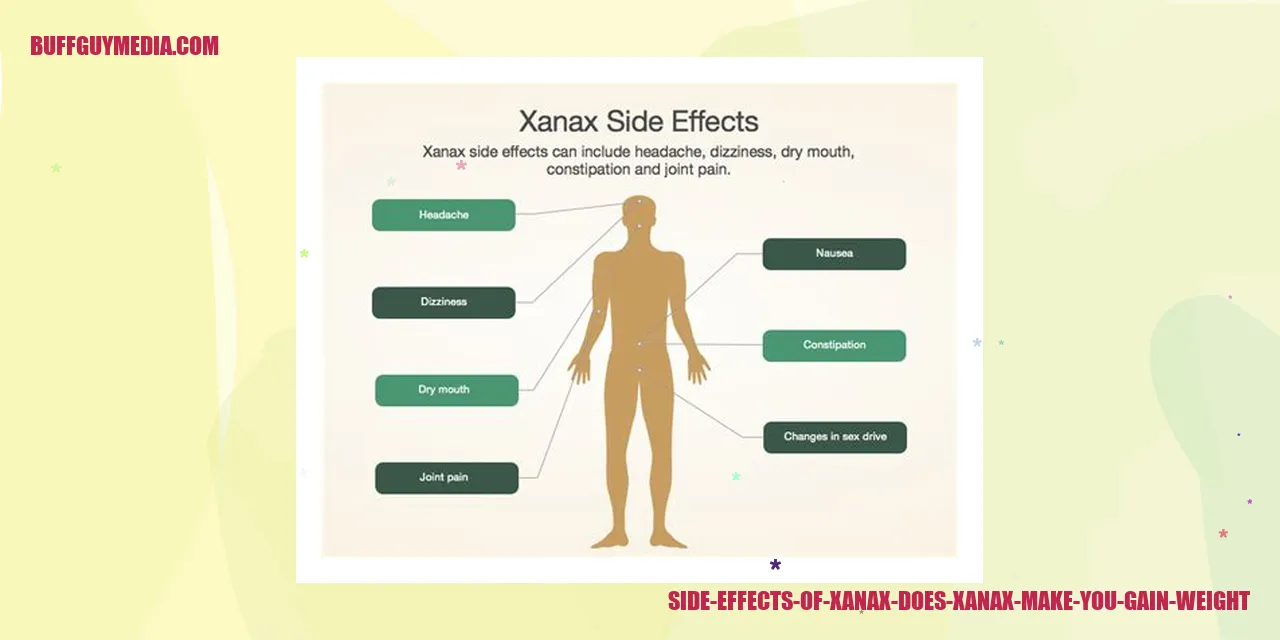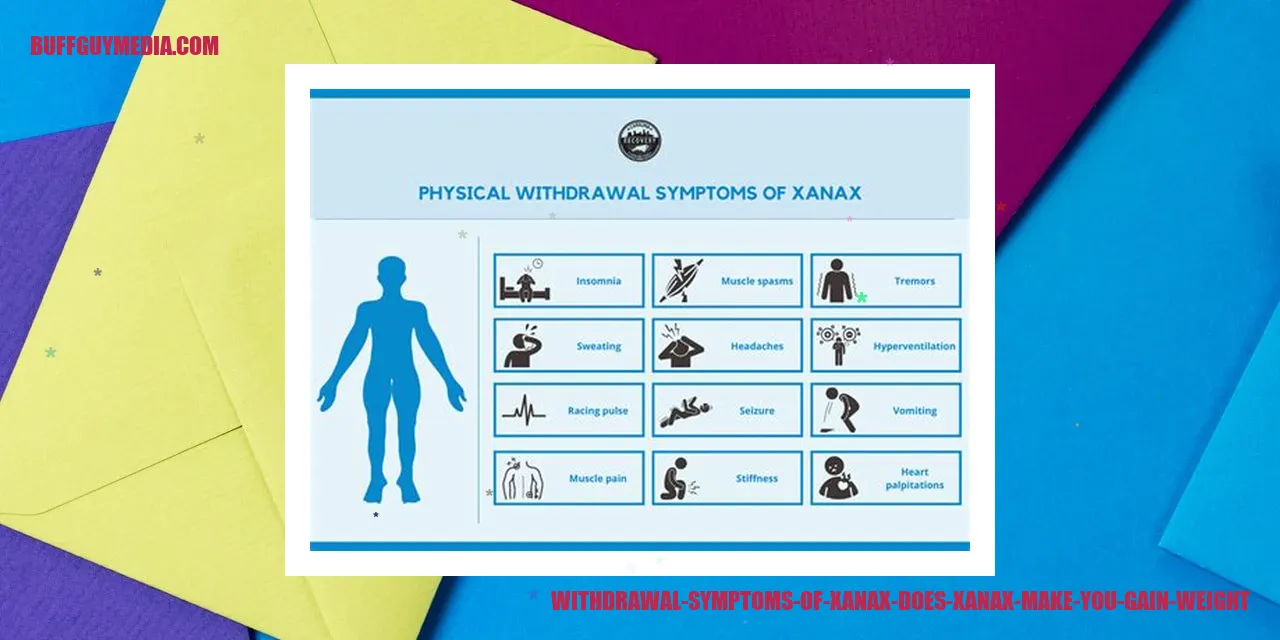Does Xanax Make You Gain Weight?
Understanding the Effects of Xanax on Weight
The Mechanism behind Xanax’s Actions
Xanax, also known as alprazolam, is a prescription medication commonly used to alleviate symptoms of anxiety and panic disorders. It belongs to a class of drugs called benzodiazepines, which function by amplifying the effects of a neurotransmitter known as gamma-aminobutyric acid (GABA) in the brain. This results in a calming and sedative effect, helping individuals to feel less worried or restless.
Influence of Xanax on Metabolism
While Xanax itself does not directly cause weight gain, it can affect metabolism, which may indirectly contribute to weight changes or make it more challenging to lose weight. The medication has the potential to slow down the body’s metabolic rate, leading to a decrease in energy expenditure that could eventually result in weight gain over a prolonged period of time.
Evidence from Research on Xanax and Weight Changes
Various studies have explored the connection between the use of Xanax and weight fluctuations. In one study published in the Journal of Clinical Psychopharmacology, it was discovered that individuals using benzodiazepines, including Xanax, had a higher likelihood of experiencing weight gain compared to those who did not use these medications. Another study published in the Journal of Obesity indicated that long-term use of benzodiazepines was associated with elevated body mass index (BMI) and increased waist circumference.
Factors Affecting Weight Gain with Xanax
Multiple factors can contribute to weight gain or fluctuations in individuals taking Xanax. These factors include individual variations in metabolism, lifestyle choices such as diet and exercise, duration of Xanax usage, dosage, and concurrent use of other medications. It is important to note that not everyone who takes Xanax will experience changes in weight, and the extent of weight gain can vary from person to person.
When facing concerns about potential weight changes, it is vital to consult with a healthcare professional who can provide personalized guidance and recommendations. They may suggest alternative medications or lifestyle adjustments to manage anxiety without impacting weight.

The side effects of Xanax
Common Side Effects
When individuals use Xanax, they may experience a range of common side effects. These can include feeling excessively tired, experiencing dizziness, having difficulty with coordination, and struggling to maintain focus. Additionally, some may notice changes in their appetite, dryness in the mouth, or mild feelings of nausea. It is crucial to recognize these side effects and seek guidance from a healthcare professional if they persist or worsen.
Rare but Serious Side Effects
[[READMORE]]
Though uncommon, there are serious side effects that may arise when taking Xanax. These can include allergic reactions, memory issues, confusion, hallucinations, and even thoughts of self-harm. It is imperative that individuals using Xanax are aware of these potential risks and immediately seek medical assistance if they experience any of these severe side effects.
Potential Long-term Effects
Extended usage of Xanax can have various effects on both the body and mind. Over time, some individuals may develop a tolerance to the medication, necessitating higher doses to achieve the desired outcome. This tolerance can lead to dependence and addiction. Additionally, abruptly stopping the use of Xanax can result in withdrawal symptoms such as anxiety, insomnia, and seizures. It is essential for individuals who have been taking Xanax for a prolonged period to closely follow their healthcare provider’s instructions when discontinuing the medication.
Also read:
Ruby’s Workout Regime: A Comprehensive Guide to Achieving Your Fitness Goals
Lactose Intolerance Diet Plan PDF: A Comprehensive Guide for Managing Your Symptoms
Understanding the Connection between Xanax and Weight Gain
Weight gain is often a concern for individuals using Xanax. While it is not a typical side effect, some users have reported fluctuations in their weight while on the medication. Xanax can impact one’s appetite and may contribute to increased food consumption or changes in metabolism for certain individuals. It is crucial to note that weight changes can vary from person to person, and anyone using Xanax should discuss any unexpected weight changes with their healthcare provider.

Weight Management Strategies for Individuals on Xanax
Achieve a Healthier Lifestyle
Successfully managing weight while taking Xanax requires embracing healthier lifestyle habits. Carve out time for activities that promote physical and mental well-being, as they contribute to maintaining a harmonious weight. Incorporate practices that enhance overall health.
Maintain a Well-Balanced Diet
An essential component of weight management when using medications like Xanax is maintaining a well-balanced diet. Opt for a nutritionally dense eating plan that includes a variety of fruits, vegetables, whole grains, lean proteins, and healthy fats.
To effectively manage weight, reduce the consumption of processed foods, sugary beverages, and foods high in saturated fats. These choices can derail weight management efforts. Additionally, remember to stay adequately hydrated by drinking an ample amount of water daily.
Commit to a Consistent Exercise Routine
Regular exercise plays a vital role in managing weight while on Xanax. Engage in various physical activities such as cardiovascular exercises, strength training, and flexibility exercises. Aim for a minimum of 150 minutes of moderate-intensity aerobic activity or 75 minutes of vigorous-intensity aerobic activity per week.
Discover exercises that bring you joy and make them a part of your daily routine. Exercise not only aids in weight management but also relieves stress, enhances mood, and promotes a healthy weight.
Seek Guidance from Healthcare Professionals
A crucial aspect of managing weight while using Xanax is seeking advice from healthcare professionals, including doctors or registered dietitians. They can provide personalized guidance that considers your specific requirements and medical background.
If you have inquiries or concerns regarding weight management, medication usage, or potential side effects, do not hesitate to consult with a healthcare provider. They will collaborate with you to formulate a comprehensive plan that ensures a healthy weight while using Xanax.
Remember, maintaining an optimal weight while taking Xanax necessitates a multifaceted approach. By adopting healthier lifestyle habits, adhering to a well-balanced diet, incorporating regular exercise, and seeking assistance from healthcare professionals, you can effectively manage your weight and improve your overall well-being.+]

Natural Approaches to Manage Anxiety
Embracing Cognitive-Behavioral Therapy (CBT)
Cognitive-Behavioral Therapy (CBT) is increasingly acknowledged as a viable alternative treatment for anxiety. It focuses on identifying and replacing harmful thought patterns and behaviors with positive ones. By understanding the connections between thoughts, emotions, and actions, individuals can acquire effective tools to effectively manage their anxiety. Often, CBT is combined with exposure therapy to gradually overcome fears in a controlled manner.
Exploring the Benefits of Meditation and Mindfulness
Meditation and mindfulness practices are gaining popularity as alternative treatments for anxiety. These techniques involve deep breathing, relaxation, and cultivating present-moment awareness. Regular incorporation of these practices into one’s routine promotes inner calmness and reduces stress levels. By practicing meditation and mindfulness, individuals can develop an increased awareness of anxiety triggers, enabling better management of symptoms.
Natural Remedies: Herbal Supplements for Anxiety
For centuries, herbal supplements and remedies have been used to alleviate anxiety symptoms. Chamomile, lavender, valerian root, and passionflower are commonly utilized herbs known for their calming effects on the nervous system. However, it is crucial to consult healthcare professionals before including any herbal supplements in an anxiety treatment plan to ensure safety and effectiveness.
Lifestyle Alterations for Enhanced Anxiety Management
Incorporating specific lifestyle changes can significantly contribute to anxiety management. Regular exercise, a balanced diet, and sufficient sleep have proven beneficial in reducing anxiety symptoms. Physical activity releases endorphins that uplift mood and reduce stress levels. A well-rounded diet, including fruits, vegetables, whole grains, and lean proteins, provides essential nutrients for optimal brain health. Adequate sleep is vital for emotional regulation and overall well-being.
In conclusion, alternative approaches such as Cognitive-Behavioral Therapy, meditation and mindfulness practices, herbal supplements, and lifestyle modifications offer effective ways to manage anxiety without solely relying on medications. By incorporating these approaches into daily routines, individuals can achieve greater balance and tranquility in their lives. It is essential to consult healthcare professionals to determine the most suitable treatment plan, prioritizing overall well-being for those dealing with anxiety.

Understanding Withdrawal Symptoms of Xanax
Common Symptoms Experienced during Withdrawal
Xanax, a commonly prescribed medication for anxiety and panic disorders, can lead to physical dependence if used for an extended period. When abruptly discontinued or dosage reduced, individuals may experience a variety of withdrawal symptoms. These commonly include heightened anxiety, difficulty sleeping, restlessness, irritability, muscle tension, headaches, trembling, excessive sweating, and challenges with concentration.
Timeline for Experiencing Xanax Withdrawal
The duration and severity of Xanax withdrawal can differ from person to person. Generally, the initial withdrawal symptoms manifest within 6-12 hours after the last dose. The peak intensity of these symptoms occurs around the second week and gradually diminishes over the following weeks. In some instances, protracted withdrawal symptoms may last for months.
Risk Factors Associated with Severe Withdrawal
Several factors contribute to an increased likelihood of experiencing severe Xanax withdrawal symptoms. Those who consume higher doses and use the medication for longer periods are more susceptible to intense withdrawal effects. Individuals with a history of substance abuse, concurrent usage of sedative drugs, or those who abruptly curtail or discontinue Xanax without medical supervision are also at a greater risk.
Importance of Seeking Professional Assistance during Withdrawal
Seeking professional help when withdrawing from Xanax is of paramount importance. Health care providers can evaluate the severity of withdrawal symptoms, establish an individualized tapering plan, and closely monitor progress. Medical supervision throughout the withdrawal process plays a crucial role in alleviating discomfort and reducing the risk of complications.
In summary, withdrawal from Xanax can lead to a range of symptoms including heightened anxiety, sleep problems, restlessness, and muscular tension. The duration of withdrawal varies, and the severity of symptoms increases with higher doses and prolonged usage. Engaging professional assistance is vital to ensure a safe and comfortable withdrawal experience.

Understanding Xanax Addiction
Recognizing the Signs and Symptoms of Xanax Addiction
Xanax, also known as alprazolam, is a prescription medication commonly prescribed to treat anxiety and panic disorders. However, it carries a high risk of addiction and abuse. It is vital to be aware of the signs and symptoms of Xanax addiction to help individuals in need.
An evident indication of Xanax addiction is a significant increase in tolerance and dependence on the drug. Over time, individuals may require higher doses of Xanax to experience the desired effect, indicating a developed tolerance. Additionally, withdrawal symptoms such as anxiety, irritability, insomnia, and even seizures may occur when attempting to reduce or stop Xanax intake.
Behavioral changes can also serve as red flags for Xanax addiction. These changes may manifest as withdrawal from social activities, neglecting responsibilities, secretive behavior, and engaging in risky activities to acquire or use the drug. Recognizing these signs is crucial in encouraging individuals to seek proper treatment.
Treatment Options for Xanax Addiction
Developing a comprehensive treatment plan tailored to the individual’s needs is crucial when addressing Xanax addiction. The treatment approach usually involves a combination of therapy, medication, and support systems to ensure a successful recovery.
Cognitive-behavioral therapy (CBT) is commonly used to assist individuals in recognizing and modifying thought patterns and behaviors contributing to their addiction. This therapy focuses on identifying triggers and developing healthy coping strategies to manage stress and anxiety without relying on Xanax.
In some cases, medications such as benzodiazepine alternatives or gradual tapering may be prescribed to facilitate safe withdrawal from Xanax. These medications can help alleviate withdrawal symptoms and reduce the risk of relapse.
Establishing a robust support system is also crucial for treatment success. Support groups like Narcotics Anonymous (NA) provide an opportunity for individuals to connect with others facing similar challenges and share their experiences. Peer support can be highly beneficial throughout the recovery process.
Support for Recovery from Xanax Addiction
Recovering from Xanax addiction requires ongoing support and dedication. It is essential for individuals to seek support not only during the early stages but throughout their recovery journey to prevent relapse and maintain sobriety.
Family and friends play a vital role in supporting those struggling with Xanax addiction. Encouraging open communication, providing a safe and understanding environment, and participating in therapy sessions or support groups together can greatly contribute to the overall recovery process.
Additionally, aftercare programs and relapse prevention strategies are key in maintaining long-term sobriety. Regular check-ins with a therapist, follow-up appointments with healthcare professionals, and engaging in activities that promote overall well-being such as exercise, mindfulness, and healthy hobbies can all aid in the recovery journey.
Remember, overcoming Xanax addiction is a journey that requires patience, determination, and adequate support. By seeking treatment, recognizing the signs of addiction, and implementing a personalized recovery plan, it is possible to overcome Xanax addiction and live a fulfilling, drug-free life.

Using Xanax Responsibly for Optimal Results
Significance of Complying with Recommended Dosage
Ensuring a safe and effective experience with Xanax, it is crucial to strictly adhere to the prescribed dosage as instructed by your healthcare professional. Xanax, a medication primarily employed to treat anxiety and panic disorders, should not be taken in excessive quantities as it can pose various risks to your health. Overdosing on Xanax can lead to heightened sedation, respiratory depression, and even life-threatening situations. It is imperative to follow the recommended dosage to achieve the desired therapeutic effects without putting yourself at unnecessary risk.
Steering Clear of Alcohol and Other Substances
Avoiding the consumption of alcohol and other substances is vital when incorporating Xanax into your treatment plan. Alcohol acts as a depressant on the central nervous system, as does Xanax. The combination of Xanax and alcohol can intensify the sedative effects, resulting in excessive drowsiness, impaired coordination, and potential memory loss. Similarly, using Xanax alongside other substances such as opioids or benzodiazepines can amplify their effects and significantly heighten the risk of respiratory depression and overdose. To ensure your well-being, it is essential to abstain from alcohol and any substances that may interact negatively with Xanax.
Possible Drug Interactions with Xanax
Xanax can interact with various medications, including both prescription and over-the-counter drugs. To avoid any potential drug interactions, it is crucial to inform your healthcare provider about all the medications you currently take. Certain medications, such as specific antidepressants, antifungal drugs, or HIV medications, can alter the levels of Xanax in your system, potentially intensifying its effects. Conversely, other medications like some anticonvulsants or antibiotics can diminish the effectiveness of Xanax. Having thorough knowledge of possible drug interactions is crucial to prevent undesirable side effects and ensure the safe use of Xanax.
Risks Associated with Xanax Misuse
Misusing Xanax can have severe implications for your physical and mental well-being. When Xanax is used outside of its prescribed indications or at higher than recommended doses, it can lead to addiction and dependence. Abruptly discontinuing Xanax can result in withdrawal symptoms, including rebound anxiety, insomnia, and even seizures. Furthermore, prolonged and excessive use of Xanax can impair cognitive function, increase the likelihood of accidents and falls, and negatively impact mental health. To mitigate these risks, it is vital to use Xanax solely for its intended purpose under the careful supervision of a healthcare professional.

Tapering Off Xanax: A Guide to Gradual Dose Reduction
Gradual Reduction of Dosage: A Safe Approach
Tapering off Xanax involves the gradual decrease of dosage, a well-established method to minimize the risks associated with suddenly stopping Xanax use. This process aims to allow the body to adapt to lower doses over time, preventing the potential shocks that can occur with abrupt discontinuation.
Benefits of Tapering Off Xanax: Minimizing Withdrawal Symptoms
Choosing to taper off Xanax offers numerous advantages compared to sudden cessation. By gradually reducing the dosage, individuals can alleviate the occurrence and severity of withdrawal symptoms that may range from mild to severe. Furthermore, this method enables the body to adjust to diminishing medication levels, reducing the likelihood of experiencing rebound anxiety symptoms that abrupt discontinuation can cause.
Withdrawal Symptoms during Tapering: A Temporary Challenge
Throughout the tapering process, individuals may encounter various temporary withdrawal symptoms such as restlessness, irritability, difficulty sleeping, muscle discomfort, tremors, and difficulty focusing. These effects arise from the brain and body adapting to the absence of Xanax. It is essential to remember that although tapering off Xanax might be challenging, these withdrawal symptoms are transient and tend to improve over time.
Professional Guidance for Tapering Off: Expert Supervision is Crucial
Tapering off Xanax should always be undertaken under the care of a healthcare professional. They can create a personalized tapering plan based on the individual’s specific needs, taking into account factors such as the dosage, duration of Xanax usage, and overall physical and mental health. Regular check-ups and constant monitoring during the tapering process are critical to address any concerns or potential complications that may arise.

The Truth About Xanax and Weight Gain
Can Xanax contribute to weight gain?
Weight gain is a potential consequence of taking Xanax. It is believed that Xanax may affect certain brain chemicals that are involved in appetite and metabolism, resulting in weight gain for some individuals.
How prevalent is weight gain with Xanax use?
The occurrence of weight gain when using Xanax varies between individuals. While not everyone will experience weight gain, studies indicate that a substantial number of users do experience this side effect.
Does weight gain occur in all Xanax users?
No, weight gain is not universal among Xanax users. While certain individuals may experience weight gain, others may not notice any changes in their weight while taking Xanax.
Can weight gain caused by Xanax be reversed?
Weight gain resulting from Xanax use can be reversed by adopting a healthy lifestyle, including regular exercise and making dietary adjustments. It is recommended to consult with a healthcare professional for personalized advice on managing weight gain when using Xanax.
What is the recommended Xanax dosage?
The recommended dosage of Xanax varies depending on the individual’s condition and should always be prescribed by a healthcare professional. It is essential to adhere to the prescribed dosage and never self-medicate or modify the dosage without medical guidance.
How long does it take to observe weight changes with Xanax?
The timeframe to notice weight changes with Xanax can vary. Some individuals may experience weight gain within a few weeks of commencing the medication, while others may require more time. Monitoring any changes in weight and seeking medical advice if needed is crucial.
Are there any weight-friendly alternatives to Xanax?
Indeed, there are alternative options to Xanax that may have a lower likelihood of causing weight gain. Some examples include other medications within the benzodiazepine class or alternative treatment approaches such as therapy or non-medication interventions. Consulting with a healthcare professional can help explore suitable alternatives based on individual needs.









